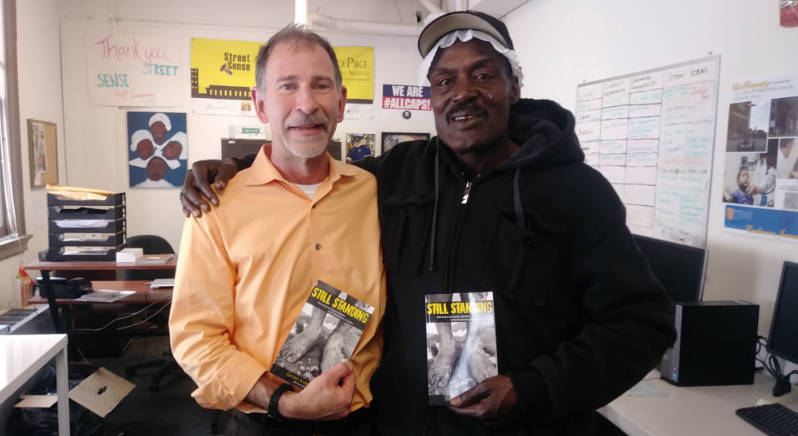The phrase “restorative justice” has been around for decades. It is the tried and true practice of using mediation between perpetrators and victims to ensure that enforcement of justice is not solely punitive, as is too often the case with our criminal justice system. But in my opinion, restorative justice is a somewhat catch-all phrase. Like other proponents of the practice, I agree that those who are fairly judged should neither automatically, nor forever, be stripped of their “right to return” to our community because they committed a violation of the community’s standards of right and wrong. But to be successful, restorative justice must also provide tools to ensure success along the road back home.
In recent months, we have been struggling with the practice of restorative justice here at Street Sense Media. More than a few of our newspaper vendors and media artists arrive at our doors with blemished pasts – poor credit histories, including past bankruptcies and evictions; failures to successfully engage in treatment for illness, including addiction; criminal behavior and incarceration(s); or previous employment-termination for cause, to name a few. Our policy – embedded by our founders in the DNA of the organization – is to welcome anyone seeking a path forward out of homelessness. We strive always to keep an open door to all.
At the same time, we aspire to maintain a strict Code of Conduct. It is the pact that binds the Street Sense Media community together. It is rooted in professionalism and common decency. It is meant to be respected between vendor and vendor, vendor and staff, and vendor and customer – current and prospective. It is our community standard of right and wrong. It encourages us towards behavior and practice that is best.
Our Code of Conduct is meaningless if we do not enforce it. Sometimes, enforcement is hard, even painful. Such is the case with vendor Gerald Anderson. Gerald is one of our very best vendors. His artistic talent, as a writer and oral storyteller, is of the highest quality. If you know him, and I have the privilege to know him just a bit, you have felt the power of his charismatic presence.
On March 21, following a judgment that he had violated our Code of Conduct, Gerald was terminated as a vendor. As a result, he was stripped of his privilege to write for or distribute our newspaper. That could have been the end of this story, but it’s not – far from it.
At Street Sense Media, we believe passionately in restorative justice. Therefore, Gerald has the right to return, the right to reclaim his place in our community. In the hours after our staff and I reached the conclusion that a termination was in order, we hammered out a plan, meant to ensure that the hard-won stability Gerald had earned would not get stripped away when he surrendered his badge and vest – the tools he needs to purchase our paper wholesale and vend it to our readers. We helped pay his April rent. We bought a stack of his books on Amazon.com so he could sell them to his regular newspaper customers. We worked to give him the chance to earn money, to afford basic sustenance and to maintain the daily routines that keep him on the path away from reincarceration.
In short, we put our wallet where our ideals were. Next, we pledged to quickly identify a training opportunity to address and remediate the behavior that led to his termination. Successful completion of that program guarantees Gerald’s return to our community, with full privileges. We then found a donor willing to pay for this new beta project to address Code of Conduct violations by vendor artists who are otherwise moving forward in life. And lastly, with this article, we are telling others what we have done because we believe it is a practice worth replicating.
Moving forward, our commitment to changing the story of homelessness via progressive policies and programs will take many forms . We will make investments in systemic advocacy and community organizing, and hire onto our paid staff former vendors or other poverty alleviation experts. Our aim: to build capacity around systemic advocacy and community organizing. Our goal: to pay more and better attention to the front doors, and barriers to the back door, that lead into and out of homelessness. Why? We are on a mission to end chronic homelessness.




